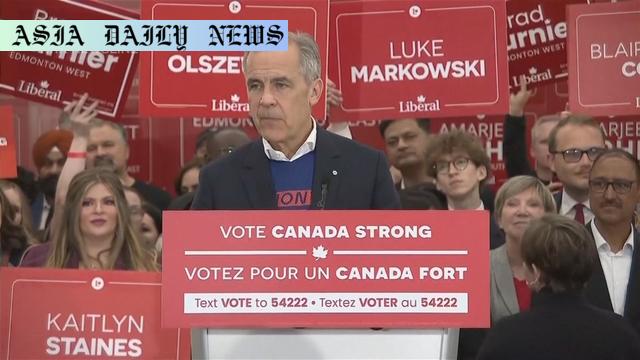Canada Election sparks debate over US tariffs and sovereignty

Introduction: Canada at a Crossroads
On Monday, Canadians headed to the polls to cast their votes in what has been one of the most contentious general elections in recent history. The election marks a pivotal moment for Canada, as its citizens decide whether to maintain Prime Minister Mark Carney’s Liberal Party government or opt for new leadership under the opposition Conservative Party. The vote occurs against the backdrop of heightened tensions with the United States, sparked by tariffs and controversial statements from U.S. President Donald Trump regarding Canada’s sovereignty.
The Tariff Battle and US-Canada Relations
One of the dominant issues affecting the election has been Canada’s strained relationship with its southern neighbor, the United States. President Trump’s decision to impose high tariffs on Canadian goods has significantly disrupted economic relations between the two nations. Moreover, Trump’s inflammatory rhetoric suggesting that Canada should become the 51st state of the U.S. has sparked outrage and strengthened nationalist sentiments within Canada. Prime Minister Mark Carney has responded firmly, introducing retaliatory tariffs and implementing strategies to protect the Canadian economy.
The Candidates: Mark Carney vs. Conservative Leadership
Mark Carney, who rose to power earlier this year, has emphasized his extensive financial experience as the former governor of both Canada’s central bank and the Bank of England. He argues that his economic expertise makes him uniquely suited to navigate the country through these challenging times. Meanwhile, the Conservative Party has taken a different approach, criticizing the Liberals for worsening economic conditions, including the soaring housing prices that have burdened Canadian families. They have campaigned on promises to secure tariff abolishment and prioritize economic recovery.
Public Sentiment and Changing Polls
The road to the election has been marked by fluctuating public opinion. Earlier this year, polls conducted by CBC indicated that the Conservatives held a significant lead over the Liberals, outpacing them by more than 20 percentage points. However, Carney’s leadership provided a boost for the Liberal Party’s popularity, helping them regain momentum and even take the lead in the polls just a month before the election. Despite this, the final days of campaigning revealed a narrowing gap between the two parties, setting the stage for a highly anticipated and closely contested outcome.
Potential Outcomes: A Nation Awaits
As Canadians await the results, the possibility of an outright Liberal majority remains uncertain. Media reports have suggested a potential victory for Carney’s party, but the Conservatives’ steady gains have kept their supporters optimistic. Regardless of the outcome, the election will set the trajectory for Canada’s domestic and foreign policies in the years to come. The stakes could not be higher, as tensions with the United States show no signs of easing and the country grapples with economic challenges that demand decisive leadership.
Conclusion: Defining Canada’s Future
The 2023 Canadian general election represents more than just another political contest—it is a referendum on how the nation should address its economic and diplomatic challenges in an increasingly uncertain global landscape. Whether the Liberals retain power or the Conservatives take over, the result will have profound implications not only for Canada but also for its relationship with the United States and its position on the world stage. Canadians and observers around the globe are watching closely as history unfolds north of the border.
Commentary
A Controversial Moment in Canadian Politics
The 2023 Canadian general election comes at a unique time in the country’s political and social history. The backdrop of this election—a fraught relationship with the United States, an economy under strain, and the rise of divisive rhetoric—has created an unprecedented moment of reflection for Canada. Citizens are deeply engaged, and for good reason: the decisions made in this election will likely shape national policies for decades to come.
Trump and the Canadian Identity
Donald Trump’s remarks about Canada’s sovereignty have understandably caused outrage and concern within the nation. Beyond being an insult to Canada’s independence, these comments highlight the complex and often imbalanced power dynamic between the two nations. For many Canadians, Trump’s rhetoric has reinforced the importance of having strong leaders who can defend the country’s autonomy and values. Mark Carney’s decision to implement retaliatory tariffs demonstrates a proactive approach, but whether voters see this strategy as effective remains to be seen.
The Economy: A Key Battleground
Economic policy has always been a critical issue in Canadian elections, but this year it has taken on an even greater significance. Soaring housing prices and the impact of U.S. tariffs have put a strain on families and businesses across Canada. While the Conservatives argue that Liberal policies have worsened these issues, Carney contends that his financial acumen is precisely what the country needs in these challenging times. Voters are faced with a difficult choice: opt for experience and a proven track record, or take a chance on the Conservatives’ promise of change.
A Nation Waits
Regardless of who emerges victorious, the 2023 election is a defining moment in Canada’s democratic history. The stakes are high, and the decisions made will ripple across industries, communities, and international relations. As we watch the results unfold, there is hope that Canada can navigate through these turbulent times with resilience, determination, and a collective commitment to the principles of democracy.


